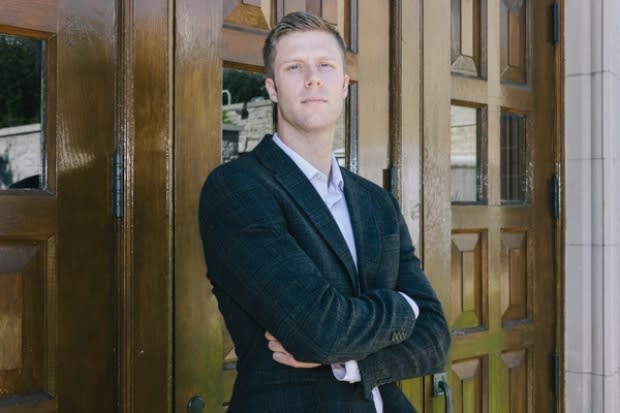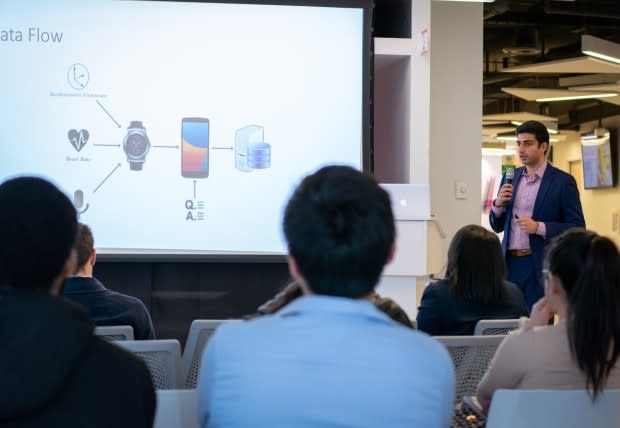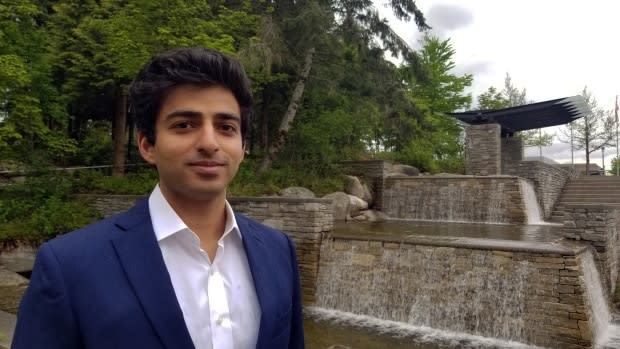How AI and smartwatches can help us cope with COVID-19
At his home in Antigonish, N.S., professor James Hughes will spend his summer glued to a computer screen, as he and other researchers race to use their technical expertise to help the province and the country cope with COVID-19.
Hughes, a computer science professor at St. Francis Xavier University, is leading a study that will use artificial intelligence (AI) to figure out the best strategies for COVID-19 testing, treatment and eventually vaccination in Nova Scotia communities.
That information can then be handed over to public health officials and other policymakers so they can make evidence-based decisions, said Hughes.
"I'm optimistic that this can save lives and get people back to work," he said.
His team will develop a computer program that duplicates people's real-world social connections that could allow for transmission of the virus.
For example, Hughes said in the simulation he would be connected to his family members and his neighbours, but he might not have any direct connection to a stranger living across town. So the program would conclude it's more likely that Hughes would contract the virus from a family member or a friend.
But the system will also be programmed to recognize that someone like a grocery store clerk would see both Hughes and the stranger, providing a way for the virus to travel to people who aren't closely connected. The simulation will try to take all those varying connections into account and reproduce how the virus travels in real life.

The computer will run multiple different scenarios in the simulation over and over again.
Each scenario will take different factors into account and determine how the population is impacted by different decisions. One scenario might look at how COVID-19 spreads without any physical distancing rules and compare it to a scenario where physical distancing is observed.
The AI examines each of the scenarios and determines which strategy gives the best results.
"They're going to be able to simulate a lot of different strategies," said Hughes, "And look for the one that gives us what we're looking for, things like flattening the curve, reducing the number of people that get infected."
Until now, experts relied on the limited data that could be incorporated into simple computer models, giving them limited results. But AI allows computer scientists to include much more information and get a clearer picture on what's actually happening in the real world.

If a vaccine is developed, being able to run these simulations will be crucial in deciding how it should be distributed. Hughes said if there is a limited supply of the vaccine, the provincial government needs to know what key groups should be vaccinated early to help prevent the spread of the virus.
Some might suggest it's best to first vaccinate frontline health workers and grocery store employees because they are the most at risk and could easily spread COVID-19 to others.
Hughes said policymakers don't have to rely on guesswork anymore.
"Now it's not just intuition, it's not just based on our anecdotes.... We simulated it a lot, and at the end of the day we compared it to a lot of different strategies," said Hughes.
Awaiting results
Hughes hopes by the end of the summer he and his team will have a solid program they can hand over to policymakers, but said the final version of the system probably won't be finished until next year.
Funding for the project comes from the Nova Scotia COVID-19 Health Research Coalition, a group of eight agencies that came together to foster innovative research, academic partnerships, and respond to the needs of Nova Scotians.
Nova Scotia's Department of Health and Wellness is waiting for those results.
"Nova Scotia's response to COVID-19 continues to evolve throughout the pandemic as further evidence becomes available. We look forward to the results of this type of research and how it might inform public health planning," said the department in an email.
Researchers in Ontario are also working on ways to use technology to fight COVID-19.
They're looking to use smartwatches and mobile devices to help monitor people isolated at home with the virus. The project, called COVIDFREE@Home, is being pursued by the computer science faculty at the University of Toronto along with University Health Network Hospitals and Sunnybrook Hospital.

The smartwatches can be loaded with specially-designed programs that will passively measure a person's respiratory rate, heart rate, and detect coughs. The information the devices collect would then be sent to a doctor monitoring the patient's condition.
Those physicians will see how patients' symptoms are changing over time and figure out whether a patient is recovering or if their condition is getting worse.
The researchers hope that over time, the information gathered through the sensors would be used to develop programs that automatically detect a decline in a patient's health.
"We want to figure out who is deteriorating so we can get them treatment earlier. Late treatment could result in worse outcomes for the patient," said Daniyal Liaqat, a postdoctoral fellow at the University of Toronto.
"The other aspect of that is to reassure patients they're actually getting better."
He said providing that reassurance is helpful because many people are worried about COVID-19 and its health consequences, and want to make sure they are still getting better. By having a doctor remotely monitor their symptoms allows people to stay home instead of going to the hospital and tying up resources.

Liaqat helped originally develop the smartwatch programs to monitor patients with chronic obstructive pulmonary disease (COPD), and is now adapting it for COVID-19 patients.
Participation in the program is completely voluntary.
So far, a mobile application for cell phones has been developed so patients can enter in their symptoms manually. The smartwatch system is still being worked on, and could be given out to patients in the next few weeks, according to Liaqat.
"It's actually really nice to see the research community coming together, especially in Canada," said Liaqat. "I think people are responding very well to the pandemic. I know there are many teams that are working on research projects to try and help out in any way they can."
MORE TOP STORIES


